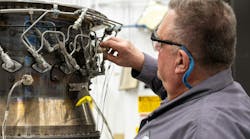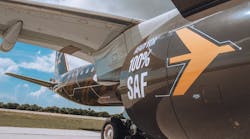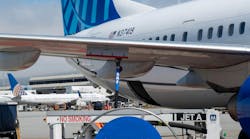U.S. Army Combat Capabilities Development Command, Army Research Laboratory (DEVCOM ARL) has awarded GE a $5.1 million research and development contract for the Applied Research Collaborative Systematic Turboshaft Electrification Project (ARC-STEP), bolstering GE’s efforts to develop hybrid electric engine technologies for the future of flight.
Included in this project is research, development, testing, and evaluation of a megawatt (MW) class electrified powerplant that further develops technologies applicable to Army Future Vertical Lift (FVL).
ARC-STEP will use a GE CT7 turboshaft engine, combined with a GE-produced electric machine and power electronics. Subject matter experts from GE and the Army across turbine engines, electrical systems, and thermal management disciplines will investigate and integrate technologies that enable lightweight, efficient, reliable, and safe hybrid-electric propulsion systems. Tests will take place at the GE's Research campus in Niskayuna, New York.
“We’re honored to continue our close partnership with the U.S. Army through ARC-STEP,” said Harry Nahatis, vice president and general manager of turboshaft engine programs at GE. “GE has a record of developing innovative products that make a difference to the U.S. Army, and we believe this is another opportunity to build on that legacy.”
“We are excited to collaborate with GE to truly advance hybrid-electric technologies for Future Vertical Lift,” says Mike Kweon, program manager for DEVCOM ARL’s Versatile Tactical Power and Propulsion Essential Research Program — known as the VICTOR ERP. “We want to further explore what is possible in these hybrid systems as well as what must be done to develop electrified systems for Future Vertical Lift that can meet the Army’s needs for increased payload, endurance, range and sufficient onboard power.”
This contract award comes shortly after NASA selected GE for the Electric Powertrain Flight Demonstration (EPFD) project to mature a MW-class integrated hybrid electric powertrain and demonstrate flight readiness for single-aisle aircraft. The EPFD and ARC-STEP awards are helping GE to continue building extensive experience with hybrid electric systems and electrical power generation. Key milestones include:
- 2009: Participating in the Boeing Subsonic Ultra Green Aircraft Research (SUGAR) study. The NASA request was to identify aircraft technologies that would lower emissions and reduce fuel consumption for future aircraft flying after 2030. The team evaluated hybrid electric propulsion systems.
- 2013: Opening the EPISCenter (Electrical Power Integrated Systems Center) in Dayton, Ohio, a dedicated facility for developing and testing electric power components and systems for aircraft.
- 2015: Successfully extracting one MW of electrical power with an F110 engine in a ground-level test cell, followed by a 2016 demonstration of MW power extraction at flight-representative altitude conditions.
- 2016: Demonstrating an electric machine consisting of a MW class motor/generator, electrically powering an 11-foot diameter propeller on a test stand.
- 2019: Demonstrating a MW class motor/generator at altitude conditions up to 36,000 feet at NASA’s Electric Aircraft Testbed (NEAT) facility in northern Ohio. GE believes this to be the world’s first power dense, MW and kilovolt class electric machine tested at flight-representative conditions.



